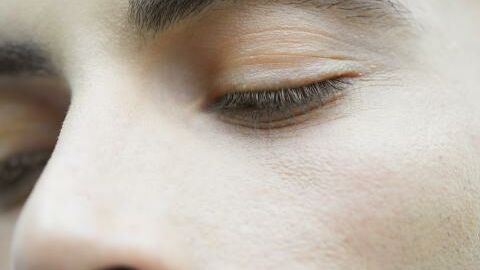Moisture barrier—when it comes to skincare, product descriptions everywhere claim to heal and repair this forcefield on our faces. And this does sound like a good thing. After all, if any skincare advert has taught us anything, it’s that moisturised and hydrated skin is the true God tier.
Discover our latest podcast
But have you ever asked yourself what the moisture barrier really is or what it does? We definitely have, so we brought in some experts to help us better understand our skin.
What is the skin’s moisture barrier, and why is it so important?
If the words moisture barrier conjures up imagery of a kind of invisible, hydrated shield over your face, you wouldn’t be half wrong.
Also known as the epidermis, stratum corneum, or acid mantle, the moisture barrier is actually the outermost layer of the skin, and its goal is to provide protection from the external environment.
Miami- based dermatologist Amber O'Brien of the Mango Clinic gave us the specifics:
The outermost layer of your skin that gives strong protection against environmental debris and bacteria and helps your skin stay hydrated and moisturised is known as the moisture barrier.
In other words, take it as a full-time defender of your skin to keep external irritants at bay. This natural barrier is made up of powerful lipids that keep your skin healthy, fresh and soft.
Signs of a damaged moisture barrier
It’s clear that the moisture barrier plays a crucial role in maintaining healthy skin, but to do so, it needs to be working at full capacity. When your moisture barrier becomes damaged, its ability to protect the skin is lessened, leading to dehydration and irritation.
Kerry Van Schoor, a New York State licensed esthetician and beauty and skincare educator at Shaw Academy, explained: ‘Exposure to day-to-day elements like the sun, wind, aircon, lighting, excessively hot water, harsh products, medication, smoking and alcohol can cause damage to the moisture barrier.’
If you start noticing any of the following, your moisture barrier might be slightly damaged: An increase in sensitivity in the skin; Dry, tight, rough feeling skin; Itchiness in areas; Red, inflamed patches on the skin that might discolour; Peeling or flaking of the outer layer of skin; Burning or stinging when you apply any products to the skin and an increase in breakouts.
How to prevent and heal moisture barrier damage
If you find yourself experiencing any of the above symptoms, you’re most likely suffering from a damaged moisture barrier. But not all is lost. The moisture barrier can be repaired through a combination of lifestyle, diet and skincare routine. That’s right, those products claiming to ‘maintain and repair the moisture barrier’ aren’t just trying to pull the wool over your eyes.
1. Drink plenty of water
Firstly, drinking enough water each day will help revitalise the moisture barrier from the inside out. ‘The skins capacity to absorb water is very limited, so assisting to keep the body hydrated will affect the moisture barrier.’
2. Avoid harsh products and potential irritants
Harsh cleansers, synthetic fragrances, over-exfoliating and piling on actives can all cause damage to the epidermis. Instead, search for gentle, pH-balanced cleansers and try to limit exfoliation to twice per week.
Van Schoor continued: ‘Avoid any skincare products which contain synthetics, colourants and synthetic fragrances; these could irritate the barrier of the skin.’
3. Take a break from exfoliation
While it’s great to exfoliate the skin twice a week, when your moisture barrier is damaged, scrubs and chemical exfoliants may provide extra irritation. Instead, try taking a break until your moisture barrier repairs itself.
4. Look for moisture barrier supporting ingredients
When searching for skincare products that aid in barrier function, look for ingredients like:
- Ceramides
- Hyaluronic acid
- Glycerin
- Squalane
- Aloe Vera
- Green tea extract
- Vitamin E
- Plant-based oils
These humectants, emollients and soothing ingredients will all mimic the natural lipids in your skin to help provide extra protection and stitch that moisture barrier back together.
If you want to lock in some extra moisture during your nighttime routine, you could even try slugging. All you need to do is apply a thin layer of vaseline or Aquaphor after your routine. This occlusive agent helps by physically preventing water loss. Just remember to wash your face in the morning!
5. Never wash your face in hot water
Have you ever wondered why people say it’s bad to wash your face in the shower? It’s because the hot water can actually cause damage to the moisture barrier. Instead, gently wash your face with lukewarm water.
6. Sunscreen, sunscreen, sunscreen
The last but possibly most important on the list is SPF. The sun’s UV rays are just the worst for the moisture barrier, and exposure to these rays can even cause free-radical damage in the skin and speed up the ageing process. Amber O’Brien urges you to ‘consider sunscreen your skin’s best friend.’
Just like a true friend defends you from anything bad for you, sunscreen does the same to your skin. UV radiations are the biggest culprit of your moisture barrier, therefore never step out of your house without applying sunscreen.
The take-home
Essentially, the moisture barrier is the skin’s sensitive but strong protector. And, to ensure that our skin stays looking happy, healthy and hydrated, we need to care for this barrier through both our habits and our skincare routines. If you’re suffering from a damaged moisture barrier and having a hard time treating it at home, book an appointment with a dermatologist or esthetician to assess transepidermal water loss and discuss more effective treatment options.















